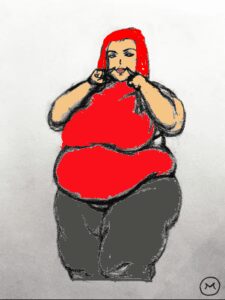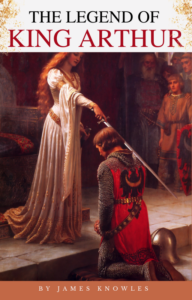The crews of repairmen were working down in the hull, and the Swiftwing was a hell of clanging noise and shuddering heat. Maintenance was working overtime, but the rest of the crew, with nothing to do, stood around in the recreation rooms, tried to play games, cursed the heat and the dreary dimness through the viewports, and twitched at the boiler-factory racket from the holds.
Toward the end of the third day, the biologist reported air, water and gravity well within tolerable limits, and Captain Vorongil issued permission for anyone who liked, to go outside and have a look around.
Bart had a sort of ship-induced claustrophobia. It was good to feel solid ground under his feet and the rays of a sun, even a green sun, on his back. Even more, it was good to get away from the constant presence of his shipmates. During this enforced idleness, their presence oppressed him unendurably—so many tall forms, gray skins, feathery crests. He was always alone; for a change, he felt that he’d like to be alone without Lhari all around him.
But as he moved away from the ship, Ringg dropped out of the hatchway and hailed him. “Where are you going?”
“Just for a walk.”
Ringg drew a deep breath of weariness. “That sounds good. Mind if I come along?”
Bart did, but all he could say was, “If you like.”
“How about let’s get some food from the rations clerk, and do some exploring?”
The sun overhead was a clear greenish-gold, the sky strewn with soft pale clouds that cast racing shadows on the soft grass underfoot, fragrant pinkish-yellow stuff strewn with bright vermilion puff-balls. Bart wished he were alone to enjoy it.
“How are the repairs coming?”
“Pretty well. But Karol got his hand half scorched off, poor fellow. Just luck the same thing didn’t happen to me.” Ringg added. “You know that Mentorian—the young one, the medic’s assistant?”
“I’ve seen her. Her name’s Meta, I think.” Suddenly, Bart wished the Mentorian girl were with him here. It would be nice to hear a human voice.
“Oh, is it a female? Mentorians all look alike to me,” Ringg said, while Bart controlled his face with an effort. “Be that as it may, she saved me from having the same thing happen. I was just going to lean against a strip of sheet metal when she screamed at me. Do you think they can really see heat vibrations? She called it red-hot.”
They had reached a line of tall cliffs, where a steep rock-fall divided off the plain from the edge of the mountains. A few slender, drooping, gold-leaved trees bent graceful branches over a pool. Bart stood fascinated by the play of green sunlight on the emerald ripples, but Ringg flung himself down full length on the soft grass and sighed comfortably. “Feels good.”
“Too comfortable to eat?”
They munched in companionable silence. “Look,” said Ringg at last, pointing toward the cliffs, “Holes in the rocks. Caves. I’d like to explore them, wouldn’t you?”
“They look pretty gloomy to me. Probably full of monsters.”
Ringg patted the hilt of his energon-ray. “This will handle anything short of an armor-plated saurian.”
Bart shuddered. As part of uniform, he, too, had been issued one of the energon-rays; but he had never used it and didn’t intend to. “Just the same, I’d rather stay out here in the sun.”
“It’s better than vitamin lamps,” Ringg admitted, “even if it’s not very bright.”
Bart wondered, suddenly and worriedly, about the effects of green sunburn on his chemically altered skin tone.
“Well, let’s enjoy it while we can,” Ringg said, “because it seems to be clouding over. I wouldn’t be surprised if it rained.” He yawned. “I’m getting bored with this voyage. And yet I don’t want it to end, because then I’ll have to fight it out all over again with my family. My father owns a hotel, and he wants me in the family business, not five hundred light-years away. None of our family have ever been spacemen before,” he explained, “and they don’t understand that living on one planet would drive me out of my mind.” He sighed. “How did you explain it to your people—that you couldn’t be happy in the mud? Or are you a career man?”
“I guess so. I never thought about doing anything else,” Bart said slowly, Ringg’s story had touched him; he had never realized quite so fully how much alike the two races were, how human the Lhari problems and dreams could seem. Why, of course, the Lhari aren’t all spacemen. They have hotel keepers and garbage men and dentists just as we do. Funny, you never think of them except in space.
“My mother died when I was very young,” Bart said, choosing his words very carefully. “My father owned a fleet of interplanetary ships.”
“But you wanted the real thing, deep space, the stars,” Ringg said. “How did he feel about that?”
“He would have understood,” Bart said, unable to keep emotion out of his voice, “but he’s dead now. He died, not long ago.”
Ringg’s eyes were bright with sympathy. “While you were off on the drift? Bad luck,” he said gently. He was silent, and when he spoke again it was in a very different tone.
“But some of the older generation—I had a professor in training school, funny old chap, bald as the hull of the Swiftwing. Taught us cosmic-ray analysis, and what he didn’t know about spiral nebulae could be engraved on my fifth toe-claw, and he’d never been off the face of the planet. Not even to one of the moons! He was the supervisor of my student lodge, and oh, was he a—” The phrase Ringg used meant, literally, a soft piece of cake.
“His feet may have been buried in mud, but his head was off in the Great Nebula. We had some wild times,” Ringg reminisced. “We’d slip away to the city—strictly against rules, it was an old-style school—and draw lots for one of us to stay home and sign in for all twelve. You see, he’d sit there reading, and when one of us came in, just shove the wax at us, with his nose in a text on cosmic dust, never looking up. So the one who stayed home would scrawl a name on it, walk out the back door, come around and sign in again. When there were twelve signed in, of course, the old chap would go up to bed, and late that night the one who stayed in would sneak down and let us in.”
Ringg sat up suddenly, touching his cheek. “Was that a drop of rain? And the sun’s gone. I suppose we ought to start back, though I hate to leave those caves unexplored.”
Bart bent to gather up the debris of their meal. He flinched as something hard struck his arm. “Ouch! What was that?”
Ringg cried out in pain. “It’s hail!”
Sharp pieces of ice were suddenly pelting, raining down all around them, splattering the ground with a harsh, bouncing clatter. Ringg yelled, “Come on—it’s big enough to flatten you!”
It looked to Bart as if it were at least golf-ball size, and seemed to be getting bigger by the moment. Lightning flashed around them in sudden glare. They ducked their heads and ran.
“Get in under the lee of the cliffs. We couldn’t possibly make it back to the Swift—” Ringg’s voice broke off in a cry of pain; he slumped forward, pitched to his knees, then slid down and lay still.
“What’s the matter?” Bart, arm curved to protect his skull, bent over the fallen Lhari, but Ringg, his forehead bleeding, lay insensible. Bart felt sharp pain in his arm, felt the hail hard as thrown stones raining on his head. Ringg was out cold. If they stayed in this, Bart thought despairingly, they’d both be dead!
Crouching, trying to duck his head between his shoulders, Bart got his arms under Ringg’s armpits and half-carried, half-dragged him under the lee of the cliffs. He slipped and slid on the thickening layer of ice underfoot, lost his footing, and came down, hard, one arm twisted between himself and the cliff. He cried out in pain, uncontrollably, and let Ringg slip from his grasp. The Lhari boy lay like the dead.
Bart bent over him, breathing hard, trying to get his breath back. The hail was still pelting down, showing no signs of lessening. About five feet away, one of the dark gaps in the cliff showed wide and menacing, but at least, Bart thought, the hail couldn’t come in there. He stooped and got hold of Ringg again. A pain like fire went through the wrist he had smashed against the rock. He set his teeth, wondering if it had broken. The effort made him see stars, but he managed somehow to hoist Ringg up again and haul him through the pelting hail toward the yawning gap. It darkened around them, and, blessedly, the battering, bruising hail could not reach them. Only an occasional light splinter of ice blew with the bitter wind into the mouth of the cave.
Bart laid Ringg down on the floor, under the shelter of the rock ceiling. He knelt beside him, and spoke his name, but Ringg just moaned. His forehead was covered with blood.
Bart took one of the paper napkins from the lunch sack and carefully wiped some of it away. His stomach turned at the deep, ugly cut, which immediately started oozing fresh blood. He pressed the edges of the cut together with the napkin, wondering helplessly how much blood Ringg could lose without danger, and if he had concussion. If he tried to go back to the ship and fetch the medic for Ringg, he’d be struck by hail himself. From where he stood, it seemed that the hailstones were getting bigger by the minute.
Ringg moaned, but when Bart knelt beside him again he did not answer. Bart could hear only the rushing of wind, the noise of the splattering hail and a sound of water somewhere—or was that a rustle of scales, a dragging of strange feet? He looked through the darkness into the depths of the cave, his hand on his shock-beam. He was afraid to turn his back on it.
This is nonsense, he told himself firmly, I’ll just walk back there and see what there is.
At his belt he had the small flashlamp, excessively bright, that was, like the energon-beam shocker, a part of regulation equipment. He took it out, shining it on the back wall of the cave; then drew a long breath of startlement and for a moment forgot Ringg and his own pain.
For the back wall of the cave was an exquisite fall of crystal! Minerals glowed there, giant crystals, like jewels, crusted with strange lichen-like growths and colors. There were pale blues and greens and, shimmering among them, a strangely colored crystalline mineral that he had never seen before. It was blue—No, Bart thought, that’s just the light, it’s more like red—no, it can’t be like both of them at once, and it isn’t really like either. In this light—
Ringg moaned, and Bart, glancing round, saw that he was struggling to sit up. He ran back to him, dropping to his knees at Ringg’s side. “It’s all right, Ringg, lie still. We’re under cover now.”
“Wha’ happened?” Ringg said blurrily. “Head hurts—all sparks—all the pretty lights—can’t see you!” He fumbled with loose, uncoordinated fingers at his head and Bart grabbed at him before he poked a claw in his eye. “Don’t do that,” Ringg complained, “can’t see—”
He must have a bad concussion then. That’s a nasty cut. Gently, he restrained the Lhari boy’s hands.
“Bartol, what happened?”
Bart explained. Ringg tried to move, but fell limply back.
“Weren’t you hurt? I thought I heard you cry out.”
“A cut or two, but nothing serious,” Bart said. “I think the hail’s stopped. Lie still, I’d better go back to the ship and get help.”
“Give me a hand and I can walk,” Ringg said, but when he tried to sit up, he flinched, and Bart said, “You’d better lie still.” He knew that head injuries should be kept very quiet; he was almost afraid to leave Ringg for fear the Lhari boy would have another delirious fit and hurt himself, but there was no help for it.
The hail had stopped, and the piled heaps were already melting, but it was bitterly cold. Bart wrapped himself in the silvery cloak, glad of its warmth, and struggled back across the slushy, ice-strewn meadow that had been so pink and flowery in the sunshine. The Swiftwing, a monstrous dark egg looming in the twilight, seemed like home. Bart felt the heavenly warmth close around him with a sigh of pure relief, but the Second Officer, coming up the hatchway, stopped in consternation:
“You’re covered with blood! The hailstorm—”
“I’m all right,” Bart said, “but Ringg’s been hurt. You’ll need a stretcher.” Quickly, he explained. “I’ll come with you and show you—”
“You’ll do no such thing,” the officer said. “You look as if you’d been caught out in a meteor shower, feathertop! We can find the place. You go and have those cuts attended to, and—what’s wrong with your wrist? Broken?”
Bart heard, like an echo, the frightening words: Don’t break any bones. You won’t pass an X-ray.
“It’s all right, sir. When I get washed up—”
“That’s an order,” snapped the officer, “do you think, on this pestilential unlucky planet, we can afford any more bad luck? Metals fatigue, Karol burned so badly the medic thinks he may never use his hand again, and now you and Ringg getting yourselves laid up and out of action? The medic will help me with Ringg; that Mentorian girl can look after you. Get moving!”
He hurried away, and Bart, his head beginning to hurt, walked slowly up the ramp. His whole arm felt numb, and he supported it with his good hand.
In the small infirmary, Karol lay groaning in a bunk, his arm bound in bandages, his head moving from side to side. The Mentorian girl Meta turned, charging a hypo. She looked pale and drawn. She went to Karol, uncovering his other arm, and made the injection; almost immediately the moaning stopped and Karol lay still. Meta sighed and drew a hand over her brow, brushing away feathery wisps that escaped from the cap tied over her hair.
“Bartol? You’re hurt? Not more burns, I hope?”
She looks just like a fluffy little kitten, Bart thought incongruously. Fatigue was beginning to blur his reactions.
“Only a few cuts,” he said, in Universal, though Meta had spoken Lhari. In his weariness and pain he was homesick for the sound of a familiar word. “Ringg and I were both caught in the hailstorm. He’s badly hurt.”
“Sit down here.”
Bart sat. Meta’s hands were skillful and cool as she sponged the blood away from his forehead and sprayed it with some pleasantly cold, mint-smelling antiseptic. Bart leaned back, tireder than he knew, half-closing his eyes.
“That hail must have been enormous; we heard it through the hull. Whatever possessed you to go out into it?”
“It wasn’t hailing when we left,” Bart said wearily. “The sun was as nice and green as it could be.” He bit the words off, realizing he had made a slip, but the girl seemed not to hear, fastening a strip of plastic over a cut. She picked up his wrist. Bart flinched in spite of himself, and Meta nodded. “I was afraid of that; it may be broken. Better let me X-ray it.”
“No!” Bart said harshly. “It’s all right, I just twisted it. Nothing’s broken. Just strap it up.”
“It’s pretty badly swollen,” the girl said, moving it gently. “Does that hurt? I thought so.”
Bart set his teeth against a cry. “It’s all right, I tell you. Just because it’s black and blue—”
He heard her breath jolt out, her fingers clenched painfully on his wounded wrist. She did not hear his cry this time. “And the sun was nice and green,” she whispered. “What are you?”
Bart felt himself slip sidewise; he thought for a moment that he would faint where he sat. Terrified, he looked up at Meta. Their eyes met, and she said, hardly moving her pale lips, “Your eyes—they’re like mine. Your eyelashes—dark, not white. You’re not a Lhari!“
The pain in his wrist suddenly blurred everything else, but Meta suddenly realized she was gripping it; she gave a little, gentle cry, and cradled the abused wrist in her palm.
“No wonder you didn’t want it X-rayed,” she whispered. Biting her lip, she glanced, terrified, at Karol, unconscious in the bunk. “No, he can’t hear us; I gave him a heavy shot of hypnin, poor fellow.”
“Go ahead,” Bart said bitterly, “yell for your keepers.”
Her gray eyes blazed at him for a moment; then, gently, she laid his wrist on the table, went to the infirmary door and locked it on the inside. She turned around, her face white; even her lips had lost their color. “Who are you?” she whispered.
“Does it matter now?”
Shocked comprehension swept over her face. “You don’t think I’d tell them,” she whispered. “I heard talk, in the Procyon port, of a spy that had managed to get through on a Lhari ship.” Her face twisted. “You—you must know about the man on the Multiphase, you know they’ll—make sure I can’t—hide anything dangerous to the Lhari at the end of the voyage.”
“Meta—” concern for her swept over him—”what will they do to you when they find out that you know and—didn’t tell?”
Her gray eyes were wide as a kitten’s. “Why, nothing. The Lhari would never hurt anyone, would they?”
Brainwashed? He set his mouth grimly. “I hope you never find out different.”
“Why would they need to?” she asked, reasonably. “They could just erase the memory. I never heard of a Lhari actually hurting anyone. But something like this—” She wavered, looking at him. “You look so much like a Lhari! How was it done? How could they do it? Poor fellow, you must be the—the loneliest man in the Universe!”
Her voice was compassionate. Bart felt his throat tighten, and had the awful feeling that he was going to cry. He reached with his good hand for hers, seeking the comfort of a human touch, but she flinched instinctively away.
He was a monster to this pretty girl….
“It looks so real,” she said helplessly. “Yes, now I can see, you have tiny moons at the base of the nail, and the Lhari don’t.” Her face worked. “It’s—it’s horrifying! How could you—”
There was a noise in the corridor. Meta gasped and ran to unlock the door, stood back as the medic and the Second Officer came in, staggering under Ringg’s weight. Carefully, they put him into a bunk. The medic straightened, shaking his crest.
“Did you get that wrist taken care of, Bartol?”
Meta stepped between Bart and the officer, reaching for a roll of bandage. “I’m working on it now, rieko mori,” she said. “It only wants strapping up.” But her fingers trembled as she wound the gauze, pulling each fold tight.
“How’s—Ringg?”
“Needs quiet,” grunted the medic, “and a few sutures. Lucky you got him under cover when you did.”
Ringg said weakly from his bunk, “Bartol saved my life. I can think of plenty who’d have run for cover, instead of staying out in that stuff long enough to drag me inside. Thanks, shipmate.”
Meta’s hand, with a swift hard pressure, lingered on Bart’s shoulder as she cut the bandage and fastened the end. “I don’t think that will bother you much now,” she whispered, fleetingly. “I didn’t dare say it was broken or they’d insist on X-rays. If it hurts I’ll get you something later for the pain. If you keep it strapped up tight—”
“It will do,” Bart said aloud. The tight bandage made it feel a little better, but he felt sick and dizzy, and when the medic turned and saw him, the officer said brusquely “Watch off for you, Bartol. I’ll fix the sign-out sheet, but you go to your cabin and get yourself at least four hours of sleep. That’s an order.“
Bart stumbled out of the cabin with relief. Safe in his own quarters, he flung himself down on his bunk, shaking all over. He’d come safely through one more nightmare, one more terror—for the moment! Had he put Meta in danger, too? Was there no end to this ceaseless fear? Not only for himself, but for others, the innocent bystanders who stumbled into plots they did not understand?
You’re doing this for the stars. It’s bigger than your fear. It’s bigger than you are, or any of the others….
He was beginning to think it was a lot too big for him.






